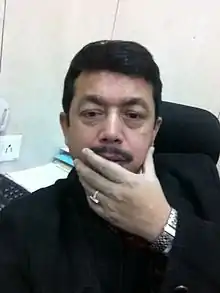Manoj Kumar Goswami
Manoj Kumar Goswami (Assamese: মনোজ কুমাৰ গোস্বামী, born 1962, Nagaon, Assam, India) is an Indian journalist.
Manoj Kumar Goswami | |
|---|---|
 | |
| Born | 1962 Nagaon,Assam |
| Nationality | Indian |
| Occupation | Editor-in-Chief of Amar Asom |
| Children | 2 |
| Parent(s) | Kamal Ch Goswami |
Biography
Goswami was born in 1962 to Kamal Ch Goswami, a college teacher and Satradhikar, and Lakhimi Goswami in a small town Nagaon in Assam. Goswami graduated from Nowgong College and later did his post graduate studies in Physics in Gauhati University. Goswami taught physics for three years before he took up writing as a profession in 1986, in response to increasing terrorist activities associated with the Assam conflict.
Goswami published a series of short story collections, including Iswarhinata, Swadhinata, Samiran Barua Ahi Ase, ' Premhinata' and Aluminumor Anguli as well as a single novel: Anadi Aru Annyana.He too has two sons called Anwit and Prannit.
Goswami's literary career was recognized with the Katha Award for Creative Fiction in 1994,[1] and the Sanskriti Award for Literature in 1996.[2] His works have been translated to other Indian languages and also to English by publications like Penguin.
To start his journalistic career Goswami joined Assamese daily newspaper Natun Dainik in 1986 under the editorship of Chandra Prasad Saikia and later became editor and executive editor of newspapers such as Ajir Batori, Amar Asom and Janasadharan. He also worked as a columnist in Asomiya Pratidin. and as the editor-in-chief of DY 365, a satellite television channel in North East India. Currently Goswami is the Editor-in-Chief of an Assamese daily Amar Asom.[3] Recently Goswami made headlines as he denied to receive the Sahitya Sanman awarded by Assam Sahitya Sabha for his writings. Goswami was trained in USA on Media's Role in Conflict Resolution. He also did a course with RT, the Russian Television network in Moscow. Goswami's highly acclaimed documentary Anshu-Everest calling was shown in various international film festival.
References
- "Katha Awards". Katha. Retrieved 12 March 2012.
- "Recipients of Sanskriti Awards (1979-2009)" (PDF). Sanskriti Awards. Retrieved 12 March 2012.
- "AmarasomAmarasom". amarasom.glpublications.in. Retrieved 3 June 2020.